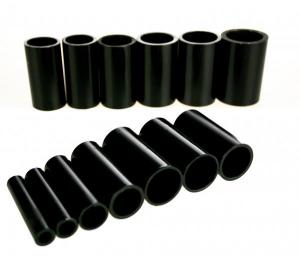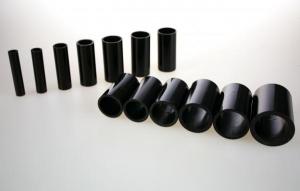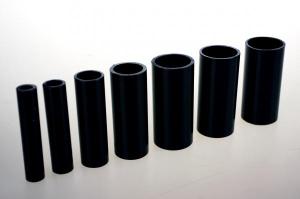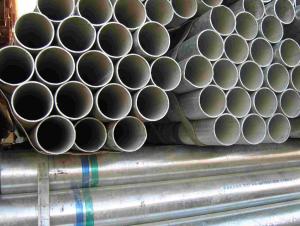Seamless Steel Tubes For Elevated Temperatures
- Loading Port:
- China Main Port
- Payment Terms:
- TT or LC
- Min Order Qty:
- 20MT m.t.
- Supply Capability:
- 5000 Tons Per Month m.t./month
OKorder Service Pledge
OKorder Financial Service
You Might Also Like
Specifications of Seamless Steel Tubes for Elevated Temperatures:
Standard:
DIN17175: Seamless Steel Tubes for Elevated Temperatures.
EN 10216-2: Seamless steel tubes for pressure purposes - Technical delivery conditions - Part 2: Non-alloy and alloy steel tubes with specified elevated temperature properties.
Size (mm):
Outer Dimensions: 3.0mm ~ 114.0mm
Wall Thickness: 0.5mm ~ 10 mm
Length: max 13000mm
Steel grade: DIN17175(St35.8, St45.8, 15Mo3, 13CrMo44, 10CrMo910), EN10216-2(P195GH, P235GH, P265GH, 13CrMo4-5, 10CrMo9-10).
Packing: Bare/bundles/crates/crate protection at the both sides of tubes or as per customers' requirements .
Painting: as requested.
DIN17175:Chemical Compositions(%)
Grade | C | Si | Mn | P | S | Cr | Mo |
St35.8 | ≤0.17 | 0.10-0.35 | 0.40-0.80 | ≤0.040 | ≤0.040 | / | / |
St45.8 | ≤0.21 | 0.10-0.35 | 0.40-1.20 | ≤0.040 | ≤0.040 | / | / |
15Mo3 | 0.12-0.20 | 0.10-0.35 | 0.40-0.80 | ≤0.035 | ≤0.035 | / | 0.25-0.35 |
13CrMo44 | 0.10-0.18 | 0.10-0.35 | 0.40-0.70 | ≤0.035 | ≤0.035 | 0.70-1.10 | 0.46-0.65 |
10CrMo910 | 0.08-0.15 | ≤0.50 | 0.40-0.70 | ≤0.035 | ≤0.035 | 0.20-0.25 | 0.90-1.20 |
DIN17175: Mechanical Properties
Grade | Yield Strength (Mpa) | Tensile Strength (Mpa) | Elongation(%) |
St35.8 | ≥235 | 360-480 | 25 |
St45.8 | ≥255 | 410-530 | 21 |
15Mo3 | ≥275 | 450-600 | 20 |
13CrMo44 | ≥290 | 440-590 | 20 |
10CrMo910 | ≥280 | 450-600 | 18 |
EN10216-2: Chemical Compositions(%)
Grade | C ≤ | Si ≤ | Mn ≤ | P ≤ | S ≤ | Cr ≤ | Mo ≤ | Cu ≤ | Ni ≤ |
P195GH | 0.13 | 0.35 | 0.70 | 0.025 | 0.020 | 0.030 | 0.08 | 0.30 | 0.30 |
P235GH | 0.16 | 0.35 | 1.20 | 0.025 | 0.020 | 0.030 | 0.08 | 0.30 | 0.30 |
P265GH | 0.20 | 0.40 | 1.40 | 0.025 | 0.020 | 0.030 | 0.08 | 0.30 | 0.30 |
13CrMo4-5 | 0.10-0.17 | 0.35 | 0.40-0.70 | 0.025 | 0.020 | 0.70-1.15 | 0.4-0.6 | 0.30 | 0.30 |
10CrMo9-10 | 0.08-0.14 | 0.50 | 0.30-0.70 | 0.025 | 0.020 | 2.00-2.50 | 0.9-1.1 | 0.30 | 0.30 |
EN10216-2: Mechanical Properties
Grade | Yield Strength (Mpa) | Tensile Strength (Mpa) | Elongation(%) | Elongation (%) |
P195GH | ≥195 | 320-440 | 27 | 25 |
P235GH | ≥235 | 360-500 | 25 | 23 |
P265GH | ≥265 | 410-570 | 23 | 21 |
13CrMo4-5 | ≥290 | 440-590 | 22 | 20 |
10CrMo9-10 | ≥280 | 480-630 | 22 | 20 |
Usage/Applications:
It is used for the pipelines of boiler industry.
Packaging & Delivery:
Each bundles pipes will be bundled with 6-8 pcs steel strips and with shipping marks and 2 nylon strips
40-50 days delivery on china port upon receiving original LC or prepayment.
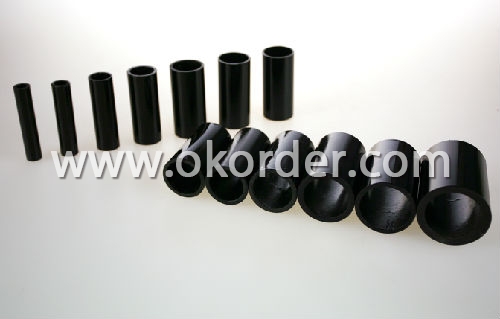
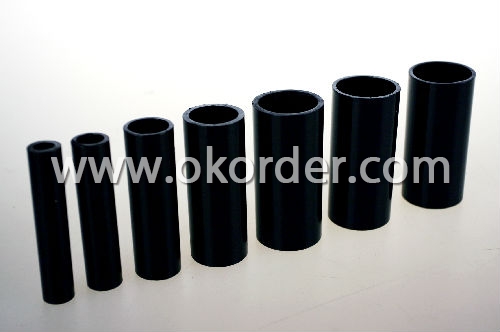
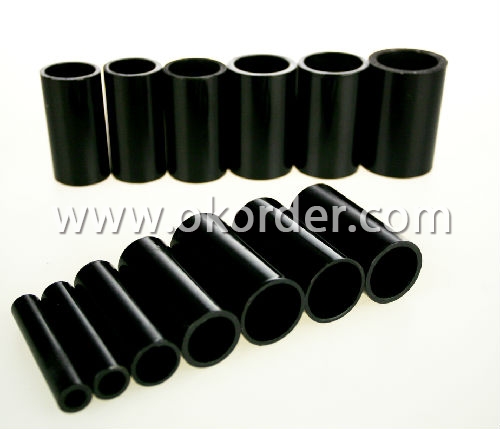
- Q:What are the specifications for steel pipes used in high-pressure applications?
- The specifications for steel pipes used in high-pressure applications typically include factors such as high tensile strength, corrosion resistance, and the ability to withstand extreme temperatures and pressures. These pipes are usually made from alloy or carbon steel with specific dimensional requirements, such as minimum wall thickness and diameter, to ensure their durability and safety under high-pressure conditions. Additionally, they may need to comply with industry standards and regulations, such as ASTM or ASME specifications, to ensure their quality and suitability for high-pressure applications.
- Q:How are steel pipes used in the transportation industry?
- Steel pipes are used in the transportation industry for various purposes, including the construction of pipelines for transporting oil, gas, and other fluids. They are also used in the manufacturing of vehicles, such as cars, trucks, and trains, where they are commonly used for exhaust systems and structural components. Additionally, steel pipes are utilized in the construction of bridges, tunnels, and other infrastructure projects that support transportation networks.
- Q:What are the common protective coatings used on the inner surface of steel pipes?
- The common protective coatings used on the inner surface of steel pipes include epoxy, polyurethane, and cement mortar coatings. These coatings provide corrosion resistance, prevent the formation of scales, and improve the durability and lifespan of the pipes.
- Q:What is the difference between steel pipe and fiberglass pipe?
- Steel pipe and fiberglass pipe differ in terms of material composition, durability, flexibility, and cost. Steel pipe is made of steel, which provides strength and resilience, making it ideal for high-pressure applications and underground installations. Fiberglass pipe, on the other hand, is composed of reinforced plastic fibers, resulting in a lightweight and corrosion-resistant material suitable for above-ground and corrosive environments. While steel pipe offers higher tensile strength, fiberglass pipe excels in its flexibility, allowing for easier installation and reduced maintenance. Additionally, steel pipe is typically more expensive due to the cost of materials and manufacturing processes, while fiberglass pipe is more cost-effective in terms of initial installation and long-term maintenance.
- Q:What is the elasticity of steel pipes?
- Steel pipes exhibit elasticity, which allows them to undergo deformation when external forces are applied and regain their original shape once the force is no longer present. The high elasticity of steel pipes is well-known, as it enables them to endure different types of stress and strain without suffering permanent deformation. This characteristic is vital in situations where pipes experience pressure, bending, or other mechanical forces. The elasticity of steel pipes is determined by material properties like its Young's modulus, which quantifies its stiffness and capacity to resist deformation.
- Q:What is the role of steel pipes in the construction of bridges and tunnels?
- Steel pipes play a vital role in the construction of bridges and tunnels as they provide structural support and durability. They are commonly used for the fabrication of the framework and foundation of these infrastructures. Steel pipes offer high tensile strength, corrosion resistance, and the ability to withstand heavy loads, making them an ideal choice for ensuring the integrity and longevity of bridges and tunnels. Additionally, steel pipes can be easily welded, allowing for efficient and cost-effective construction methods.
- Q:What are the different types of steel pipe flanges?
- There are several types of steel pipe flanges, including slip-on flanges, weld neck flanges, socket weld flanges, threaded flanges, blind flanges, and lap joint flanges. Each type has unique features and is used in specific applications based on factors such as pressure ratings, pipe size, and end connections.
- Q:What are the different methods of coating steel pipes for insulation?
- There are several methods of coating steel pipes for insulation, each with its own advantages and disadvantages. 1. Thermal Insulation Coating: This method involves applying a layer of thermal insulation material, such as mineral wool or foam, onto the steel pipe. The insulation material helps to reduce heat transfer and minimize energy loss. Thermal insulation coatings are relatively easy to apply and can provide excellent insulation properties. However, they may be prone to degradation over time and may require regular maintenance and replacement. 2. Corrosion Protection Coating: Steel pipes are often coated with corrosion protection materials, such as epoxy or polyethylene, to prevent rust and corrosion. These coatings act as a barrier between the steel surface and the surrounding environment, protecting the pipe from moisture, chemicals, and other corrosive elements. Corrosion protection coatings are typically durable and long-lasting, providing effective protection for the steel pipe. However, they may not provide significant thermal insulation properties. 3. Fusion-Bonded Epoxy (FBE) Coating: FBE coating is a popular method for both insulation and corrosion protection. It involves applying a layer of epoxy powder to the steel pipe and then heating it to create a strong, durable bond. FBE coatings provide excellent adhesion and resistance to corrosion, as well as some thermal insulation properties. They are commonly used in oil and gas pipelines and can withstand high temperatures and harsh environments. 4. Polyurethane Foam Coating: Polyurethane foam is often used as an insulation coating for steel pipes. It is applied by spraying or injecting the foam onto the pipe surface, which then expands and hardens to create a protective layer. Polyurethane foam coatings provide excellent thermal insulation properties and can be applied to pipes of various sizes and shapes. However, they may require special equipment and expertise for application and may be susceptible to physical damage or moisture absorption if not properly sealed. 5. Ceramic Coating: Ceramic coatings are another option for insulating steel pipes. These coatings are typically applied using a thermal spray process, which creates a layer of ceramic material on the pipe surface. Ceramic coatings can provide high-temperature insulation, corrosion resistance, and thermal shock protection. They are commonly used in industries such as power generation and aerospace, where extreme temperature conditions are present. However, ceramic coatings can be expensive and may require specialized equipment and expertise for application.
- Q:Can steel pipes be used for underground cable conduits?
- Yes, steel pipes can be used for underground cable conduits.
- Q:How are steel pipes repaired if they are damaged?
- Steel pipes can be repaired if they are damaged through various methods such as welding, patching, or replacing the damaged section with a new pipe. The specific repair technique depends on the extent and nature of the damage.
1. Manufacturer Overview |
|
|---|---|
| Location | Wuxi, China |
| Year Established | 1991 |
| Annual Output Value | 300,000Tons |
| Main Markets | Europe; Southeast Asia; etc. |
| Company Certifications | API 5L;API 5CT;API Q1;ISO/TS29001 |
2. Manufacturer Certificates |
|
|---|---|
| a) Certification Name | |
| Range | |
| Reference | |
| Validity Period | |
3. Manufacturer Capability |
|
|---|---|
| a)Trade Capacity | |
| Nearest Port | Wuxi; Shanghai |
| Export Percentage | 41% - 50% |
| No.of Employees in Trade Department | 3900-4000 People |
| Language Spoken: | English; Chinese; Spanish |
| b)Factory Information | |
| Factory Size: | Above 450,000 square meters |
| No. of Production Lines | Above 10 |
| Contract Manufacturing | OEM Service Offered;Design Service Offered |
| Product Price Range | Average |
Send your message to us
Seamless Steel Tubes For Elevated Temperatures
- Loading Port:
- China Main Port
- Payment Terms:
- TT or LC
- Min Order Qty:
- 20MT m.t.
- Supply Capability:
- 5000 Tons Per Month m.t./month
OKorder Service Pledge
OKorder Financial Service
Similar products
New products
Hot products
Hot Searches
Related keywords
